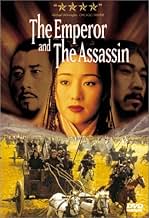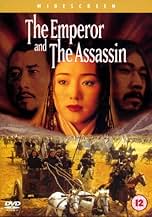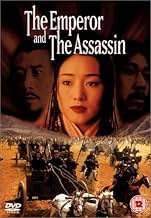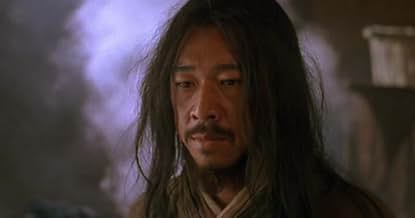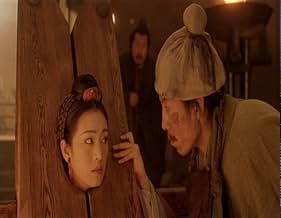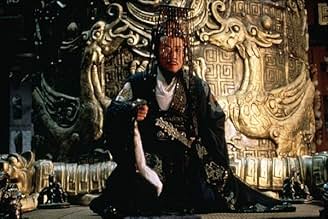CALIFICACIÓN DE IMDb
7.2/10
6.6 k
TU CALIFICACIÓN
Agrega una trama en tu idiomaIn pre-unified China, the King of Qin sends his concubine to a rival kingdom to produce an assassin for a political plot, but as the king's cruelty mounts she finds her loyalty faltering.In pre-unified China, the King of Qin sends his concubine to a rival kingdom to produce an assassin for a political plot, but as the king's cruelty mounts she finds her loyalty faltering.In pre-unified China, the King of Qin sends his concubine to a rival kingdom to produce an assassin for a political plot, but as the king's cruelty mounts she finds her loyalty faltering.
- Premios
- 7 premios ganados y 11 nominaciones en total
- Dirección
- Guionistas
- Todo el elenco y el equipo
- Producción, taquilla y más en IMDbPro
Opiniones destacadas
This is an epic film about the unification of the ancient kingdoms of China in the third century BC. What makes it interesting is the tragic downfall of the king and all the palace intrigue going on around him. It reminded me a bit of "King Lear" and some of the other Shakespeare plays.
The king starts out with noble ambitions, to unify the kingdoms under one ruler and to stop all the quarrelling so that the people can prosper and lead better lives. He and his childhood sweetheart, played beautifully by Li Gong, concoct a scheme whereby she pretends to go into exile in a rival kingdom in order to recruit an assassin to kill the king, thus giving him a pretext to go to war. But while she's away, the king becomes sadistic in his lust for power and goes on a killing spree.
There are numerous side plots that keep the action going. There is the Marquis, who pretends to be stupid and foppish but who's really very clever and wants to become king himself. He fathers two children with the king's mother and manages to keep it secret for years. Then there is the Prime Minister, a political rival to the king, who turns out to really be his father.
The assassin is a complex character himself. An adept swordsman and killer, he is undergoing a reformation when the king's lover comes to recruit him. He wants nothing more with killing, but is eventually won over by Li Gong (who wouldn't be?) when he sees how cruel and vicious the king has become.
Some spectacular cinematography, especially the battle scenes that are carried out on a grand scale - like they used to say, a cast of thousands, literally. The acting is OK, nothing special. It's the story that's interesting, though at over two and a half hours, it pushes the limit.
Definitely worth viewing.
The king starts out with noble ambitions, to unify the kingdoms under one ruler and to stop all the quarrelling so that the people can prosper and lead better lives. He and his childhood sweetheart, played beautifully by Li Gong, concoct a scheme whereby she pretends to go into exile in a rival kingdom in order to recruit an assassin to kill the king, thus giving him a pretext to go to war. But while she's away, the king becomes sadistic in his lust for power and goes on a killing spree.
There are numerous side plots that keep the action going. There is the Marquis, who pretends to be stupid and foppish but who's really very clever and wants to become king himself. He fathers two children with the king's mother and manages to keep it secret for years. Then there is the Prime Minister, a political rival to the king, who turns out to really be his father.
The assassin is a complex character himself. An adept swordsman and killer, he is undergoing a reformation when the king's lover comes to recruit him. He wants nothing more with killing, but is eventually won over by Li Gong (who wouldn't be?) when he sees how cruel and vicious the king has become.
Some spectacular cinematography, especially the battle scenes that are carried out on a grand scale - like they used to say, a cast of thousands, literally. The acting is OK, nothing special. It's the story that's interesting, though at over two and a half hours, it pushes the limit.
Definitely worth viewing.
Based on the actual event , this epic, is set in the year 221 B.C and tells the true story of the unification of China. Action packed and filled with intrigue, passion, betrayals and unforgettable battle sequences, it held my attention throughout in spite of its 160 minute length.
The king, Ying Zeng, played by Li Xuejian is obsessed with unifying the seven kingdoms of China and becoming its first Emperor. His lover, Lady Zhao, played by the beautiful actress Gong Li, devises a plot whereby she will travel to the neighboring kingdom of Yan to set a fake assassination plot in motion which will give the king an excuse to invade Yan. However, she falls in love with the assassin as the king becomes more and more ruthless.
There are subplots, and tragedy and constant high drama. There are scenes of great beauty and of abject cruelty. There is great cinematography and brilliant use of physical space.
The deep characterization made me think of Shakespeare. And tragic events that call to mind Greek drama. And yet it is totally Chinese as it deals with age-old questions of whether the ends justify the means. And raises the questions dealing with life and death and good and evil and all the blurred edges in between.
It is the story of individuals against the backdrop of history, a history that has shaped China for the past two thousand years. I was swept up in the story as well as the moral questions raised. There are no easy answers and this was one of the strengths of the movie.
Recommended. But be prepared for the violence and gore.
The king, Ying Zeng, played by Li Xuejian is obsessed with unifying the seven kingdoms of China and becoming its first Emperor. His lover, Lady Zhao, played by the beautiful actress Gong Li, devises a plot whereby she will travel to the neighboring kingdom of Yan to set a fake assassination plot in motion which will give the king an excuse to invade Yan. However, she falls in love with the assassin as the king becomes more and more ruthless.
There are subplots, and tragedy and constant high drama. There are scenes of great beauty and of abject cruelty. There is great cinematography and brilliant use of physical space.
The deep characterization made me think of Shakespeare. And tragic events that call to mind Greek drama. And yet it is totally Chinese as it deals with age-old questions of whether the ends justify the means. And raises the questions dealing with life and death and good and evil and all the blurred edges in between.
It is the story of individuals against the backdrop of history, a history that has shaped China for the past two thousand years. I was swept up in the story as well as the moral questions raised. There are no easy answers and this was one of the strengths of the movie.
Recommended. But be prepared for the violence and gore.
Chen Kiage (Farewell My Concubine) and Zhang Yimou (Red Sorghum, To Live) have been always considered two of the greatest director of modern China cinema history. This time Chen took three years after his previous film and came back with a movie about the first Chinese emperor Qin and his legendary story with a woman he loves, his adversary and an assassin in very ancient China of 221 BC. Assassin Jingke stab emperor Qin is a well know story that nearly every Chinese know it so well. Assassin Jingke was considered a biggest hero in the history for his great sacrifice spirit and the brave suicide assassination, although his action was failed. Zhang Fengyi is one of my favorite actor (I like his performance in Farewell my concubine), his assassin Jinke is silent and full of passion in the heart, that is convincing. Li Xuejian is honorable actor but just miscast here, His King Qin is always with tears in his eyes and feels miserable. I can not understand why Chen decides to make this most tyranny emperor in the Chinese history always crying. The most attractive role in the movie is Marquis Changxin, he married Qin's mother and most time he looks like idiot but actually he has his own ambitious plan. Marquis Changxin is convincingly played by Wang Zhiwen, I like him so much.
The movie do have some memorable moments, one is Jingke took a assignment to kill the whole family of ironsmith, but when he facing the angelic blind daughter of ironsmith, he cannot do his job. Late, the daughter killed herself. That event had a biggest influence for the rest of Jingke's life, also a big impact for the audience.
The movie has some most popular Chinese comedian (Pan Changjiang for prison officer and Zhao Benshan for Gao Jianli) for the friendly cameo, when they appears in the screen, audience shout and smiled. This would not happened when this movie is showed in country outside China.
I don't know if it is the biggest budget film in China, but it is surely one of them. They built Qin's palace especially for this movie and now becomes a tourist sight. It is near my city. I didn't go there but my father did. He said it is great building.
Overall, this is the excellent movie for the people like ancient Chinese costume and culture. The photography is very beautiful. Compared to the greatest "Farewell My Concubine", Chen does not make it reach that level. I give it *** for the rate from * to ****.
The movie do have some memorable moments, one is Jingke took a assignment to kill the whole family of ironsmith, but when he facing the angelic blind daughter of ironsmith, he cannot do his job. Late, the daughter killed herself. That event had a biggest influence for the rest of Jingke's life, also a big impact for the audience.
The movie has some most popular Chinese comedian (Pan Changjiang for prison officer and Zhao Benshan for Gao Jianli) for the friendly cameo, when they appears in the screen, audience shout and smiled. This would not happened when this movie is showed in country outside China.
I don't know if it is the biggest budget film in China, but it is surely one of them. They built Qin's palace especially for this movie and now becomes a tourist sight. It is near my city. I didn't go there but my father did. He said it is great building.
Overall, this is the excellent movie for the people like ancient Chinese costume and culture. The photography is very beautiful. Compared to the greatest "Farewell My Concubine", Chen does not make it reach that level. I give it *** for the rate from * to ****.
10oaksong
I've read some grumbles about the court scenes. These people betray their ignorance. This production went to simply amazing lengths to recreate all aspects of the period in which the story occurred. Courtly manners are something few people outside the court ever see. While the acting may appear highly stylized, it is, in fact, as close a replication as possible of the behavior of individuals in their particular stations as the director could create. The actor's facial expressions are a marvel, particularly the duplicitous Marquis Changxin and the King's mother.
There are, of course, reflections of both Greek and Shakespearian tragedy in the relationship between the king, his parents and his love. The juxtaposition of the king transforming from good to bad and the assassin from bad to good provides much food for thought on the evolution of an individual's nature. This movie would provide much to ponder in a college course on the humanities.
At the same time, it almost rushes along, even in the slowest scenes heading towards an inexorable denouement. One suspects the involvement of large portions of the troop movements, which were quite awesome. It makes The Lord of the Rings battle scenes pale by comparison. Few directors have the ability to literally field thousands of humans on the field of battle just for art's sake. I recall one scene in which at least 30,000 troops can be seen moving across a huge plain. The logistics for such a shot would have been staggering.
I could go on... but simply, I can't recommend this film highly enough.
There are, of course, reflections of both Greek and Shakespearian tragedy in the relationship between the king, his parents and his love. The juxtaposition of the king transforming from good to bad and the assassin from bad to good provides much food for thought on the evolution of an individual's nature. This movie would provide much to ponder in a college course on the humanities.
At the same time, it almost rushes along, even in the slowest scenes heading towards an inexorable denouement. One suspects the involvement of large portions of the troop movements, which were quite awesome. It makes The Lord of the Rings battle scenes pale by comparison. Few directors have the ability to literally field thousands of humans on the field of battle just for art's sake. I recall one scene in which at least 30,000 troops can be seen moving across a huge plain. The logistics for such a shot would have been staggering.
I could go on... but simply, I can't recommend this film highly enough.
For a feature film, the plot closely follows history--or at least historical gossip. But then the Chinese, who know the story very well from seeing it portrayed again and again, would never tolerate it otherwise. The attention to detail is wonderful, especially for anyone who has read Sima Qian's account in the Records of the Historian. Jing Ke, according to Sima Qian, did indeed make an attempt on Qin Shi Huang's life at the request of the Crown Prince of Yan before unification. Sima Qian explicitly mentions both the head of General Fan and the dagger rolled up into the map, as well as the dagger being thrown into the brass column. Although Jing Ke is described as no stranger to swordplay, he's hardly the invincible warrior portrayed by Chen Kaige. Jing Ke is indeed this film's weakest link. In reality (again, according to Sima Qian), he was a heavy drinker and put off his visit to Qin for as long as possible, spending a good deal of time with the ladies of Yan before the crown prince finally ordered him on his way. He was, in short, a human being and was not looking forward to death although he was willing to accept it. Chen Kaige's Jing Ke is afraid of death, but not his own. He is the classic ruthless killer turned disillusioned pacifist. His love (or maybe just affection) for a woman and pity for several hundred children whom Zheng had buried alive (not even two thousand years of hostile Confucian historians claimed Qin Shi Huang did this, although there is a legend about him burying 460 Confucians up to their necks and then beheading them)is enough to make this former assassin kill again. The melodrama is not convincing and the character ends up being just plain boring. The acting here isn't shabby, though not very interesting given the character. As for Lady Zhou, in all the numerous stories I've heard about Qin Shi Huang, she's never come up. Anyway, Gong Li is famous enough for Americans to have heard of her (thanks to Zhang Yimou) and there needed to be a love interest, so here she is. It's unfortunate that her performance is almost as wooden as Jing Ke's character. She's done much better (in Qiu Ju for example) at being subtle; here she just barely manages presence. But all of this is trivial compared to the extraordinary acting of Li Xuejian as Zheng himself. Qin Shi Huang is for the Chinese rather what Milton's Satan is for us: accepted as a villain, but a noble one. Qin Shi Huang's accomplishments radiate an awe all the way across two thousand years into the present and Li captures his frightening will without compromising his humanity. Li's performance is enough, but the scope of the film is grand although the photography is purposely drab. It does feel ancient. The score is adequate, scarcely moving though very appropriate to the action. Though I've only seen it once, I believe that Chen Kaige should be given more credit for his camera work than other reviewers have allowed him. The opening credits are exhilarating. If five stars its absolutely average, I given three more for Li Xuejian's acting and Chen Kaige as an actor, writer, and director.
¿Sabías que…?
- TriviaThe Xianyang palace was reconstructed in its entirety in the city of Dongyang in Zhenjiang province. Much of the film, including the final scene, was shot there. It is now being preserved as a theme park drawing large numbers of tourists. In addition, the capital cities of the other kingdoms featured in the film, Yan Zhao and Han, were constructed as several sights across China. All have been meticulously built to scale with special attention paid to their historical accuracy.
- Versiones alternativasFirst cut was deemed regime-critic by chinese censors and therefore rejected. Approximately 30 minutes were cut to make a more regime-friendly version.
Selecciones populares
Inicia sesión para calificar y agrega a la lista de videos para obtener recomendaciones personalizadas
- How long is The Emperor and the Assassin?Con tecnología de Alexa
Detalles
- Fecha de lanzamiento
- Países de origen
- Sitios oficiales
- Idioma
- También se conoce como
- The Emperor and the Assassin
- Productoras
- Ver más créditos de la compañía en IMDbPro
Taquilla
- Presupuesto
- USD 15,000,000 (estimado)
- Total en EE. UU. y Canadá
- USD 1,267,239
- Fin de semana de estreno en EE. UU. y Canadá
- USD 47,295
- 19 dic 1999
- Total a nivel mundial
- USD 1,267,239
- Tiempo de ejecución
- 2h 42min(162 min)
- Color
- Mezcla de sonido
- Relación de aspecto
- 1.85 : 1
Contribuir a esta página
Sugiere una edición o agrega el contenido que falta


